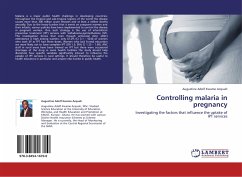Malaria is a major public health challenge in developing countries. Throughout the tropical and sub-tropical regions of the world the disease causes more than 300 million acute illnesses and at least a million deaths annually. Due to the heavy burden that it exerts on pregnant women and their infants, various policies have been implemented to control the disease in pregnant women. One such strategy is the use of intermittent preventive treatment (IPT) services with Sulfadoxine-pyrimethamine (SP). This investigation shows that even though antenatal clinic (ANC) attendance is high among women, only 47.2% (CI 3.1 50.8) of women who took SP as IPT had three doses. Women who lack formal education are more likely not to have complete IPT (OR 1.5; 95% CI 1.23 1.69). ANC staff in rural areas have been trained on IPT but there were occasional shortages of the drug in some health facilities. The study should help illuminate how specific variables significantly interact to influence the uptake of IPT services in rural settings. It should therefore be useful to health educators in particular and anyone else involve in public health.







